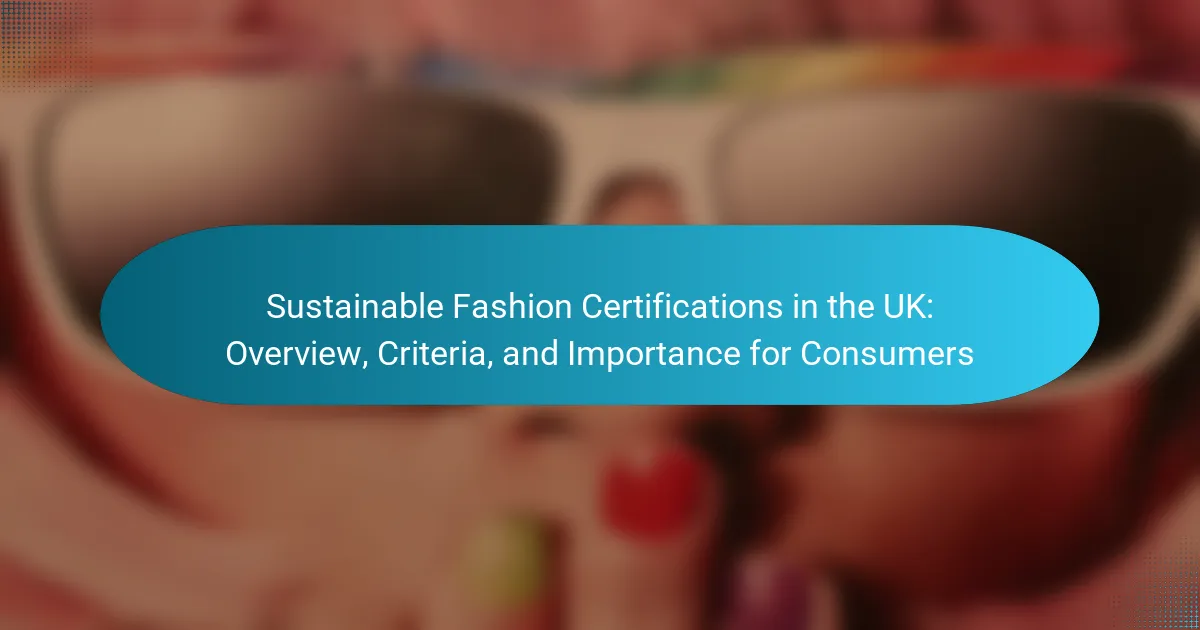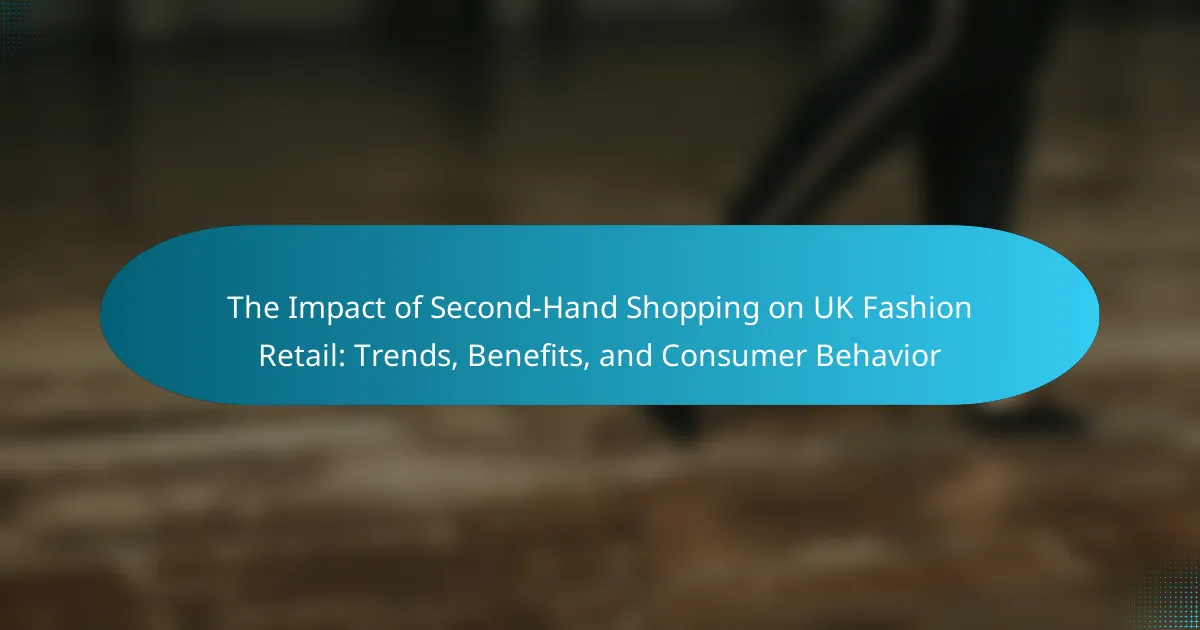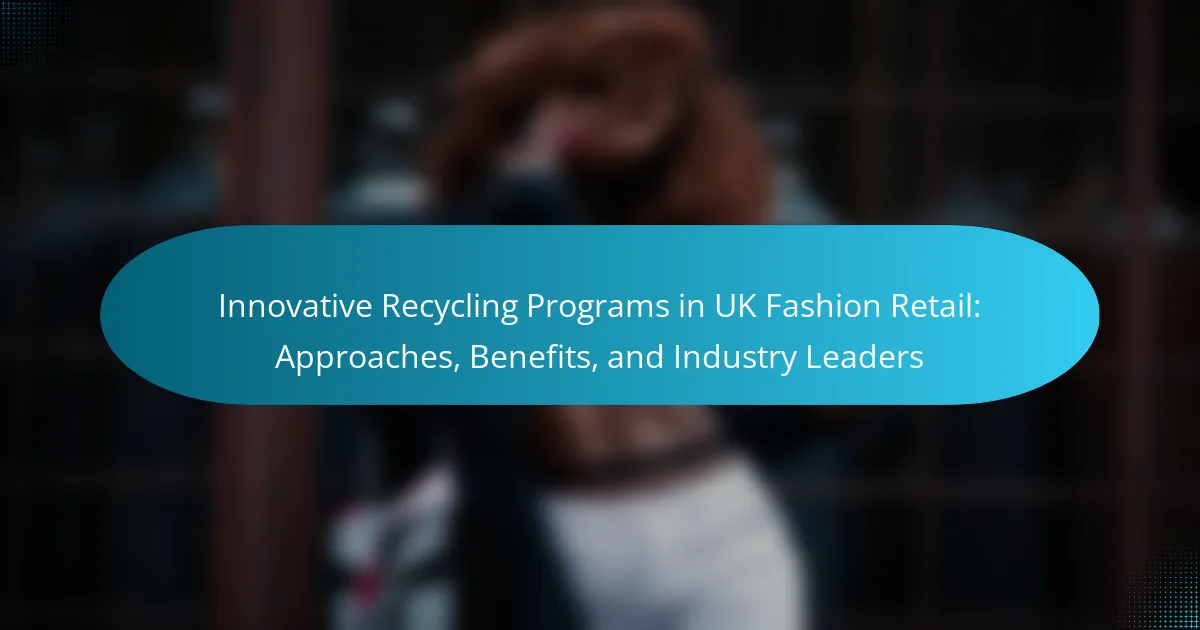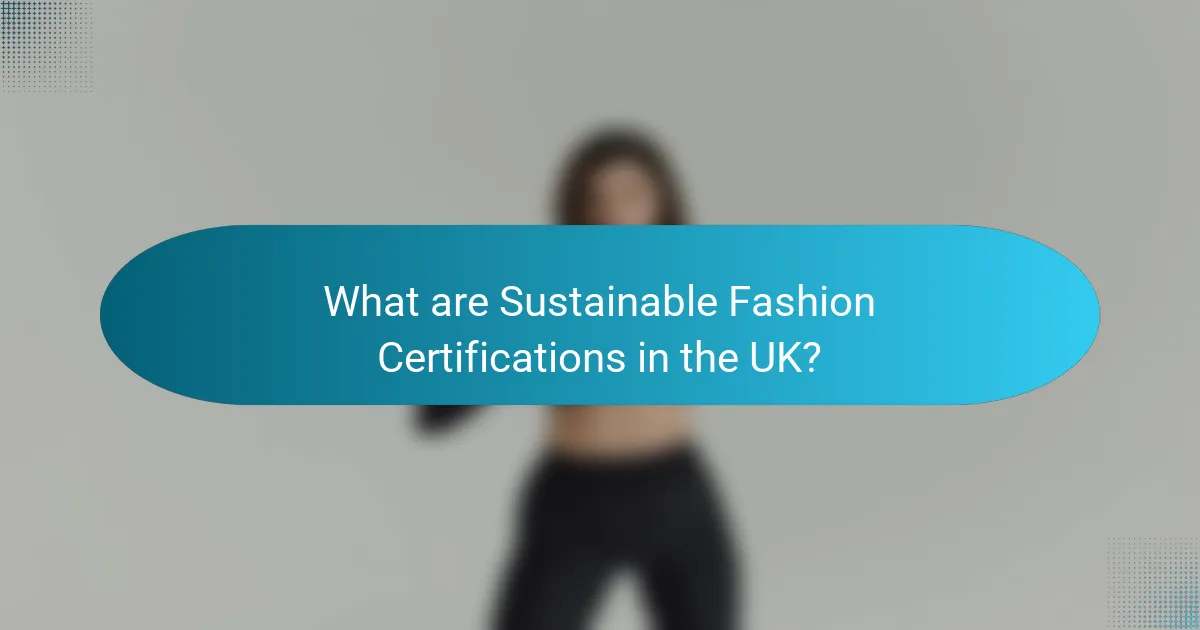
What are Sustainable Fashion Certifications in the UK?
Sustainable fashion certifications in the UK are recognized standards that validate eco-friendly practices in the fashion industry. They assess brands based on criteria such as ethical labor practices, environmental impact, and sustainable sourcing. Notable certifications include the Global Organic Textile Standard (GOTS), which focuses on organic fibers and sustainable production. Another key certification is the Ethical Trading Initiative (ETI), which promotes fair labor conditions. The British Retail Consortium (BRC) also offers certifications that emphasize safety and sustainability in retail. These certifications help consumers identify brands committed to sustainable practices. They play a crucial role in promoting transparency and accountability within the fashion sector.
Why are Sustainable Fashion Certifications important?
Sustainable fashion certifications are important because they provide consumers with verified information about the sustainability practices of brands. These certifications help to ensure that products meet specific environmental and ethical standards. For instance, certifications like GOTS and Fair Trade guarantee organic materials and fair labor practices. This transparency fosters consumer trust and promotes responsible purchasing decisions. Additionally, certifications can drive brands to adopt more sustainable practices to meet certification criteria. Research shows that consumers are increasingly prioritizing sustainability in their purchasing choices, with 66% willing to pay more for sustainable brands. Thus, certifications play a crucial role in guiding consumer behavior and supporting the sustainable fashion industry.
What role do these certifications play in consumer choices?
Certifications in sustainable fashion significantly influence consumer choices. They provide assurance regarding the ethical and environmental standards of products. Certifications help consumers identify brands committed to sustainability. This trust can lead to increased brand loyalty and repeat purchases. Research shows that 67% of consumers prefer to buy from certified brands. Certifications also educate consumers about sustainable practices and encourage informed purchasing decisions. Overall, they serve as a key differentiator in a crowded market.
How do they impact the fashion industry as a whole?
Sustainable fashion certifications significantly impact the fashion industry by promoting ethical practices and environmental responsibility. These certifications encourage brands to adopt sustainable materials and production methods. For instance, certifications like GOTS and Fair Trade set standards for organic textiles and fair labor practices. This leads to reduced waste and lower carbon footprints in production processes. Additionally, consumer awareness of these certifications drives demand for sustainable products. Research indicates that 66% of consumers are willing to pay more for sustainable brands. Consequently, brands that achieve these certifications often gain a competitive advantage in the market. Overall, sustainable fashion certifications shape industry standards and consumer behavior towards more responsible fashion choices.
What types of Sustainable Fashion Certifications exist in the UK?
The types of Sustainable Fashion Certifications that exist in the UK include the Global Organic Textile Standard (GOTS), the Ethical Trading Initiative (ETI), and the Fair Trade certification. GOTS certifies organic textiles, ensuring environmental and social criteria are met. The ETI focuses on improving working conditions in global supply chains. Fair Trade certification guarantees fair wages and ethical treatment for workers. Other certifications include the Better Cotton Initiative (BCI), which promotes sustainable cotton farming practices, and the Oeko-Tex Standard 100, which ensures textiles are free from harmful substances. These certifications help consumers identify brands committed to sustainability and ethical practices.
What are the most recognized certifications?
The most recognized certifications in sustainable fashion include GOTS, OEKO-TEX, and Fair Trade. GOTS, or Global Organic Textile Standard, certifies organic textiles and ensures environmentally and socially responsible production. OEKO-TEX focuses on testing for harmful substances in textiles, promoting safety for consumers and the environment. Fair Trade certification guarantees fair wages and safe working conditions for producers. These certifications are widely acknowledged in the industry and among consumers. They provide assurance of sustainable practices and ethical sourcing. Their recognition supports informed consumer choices in fashion.
How do these certifications differ from one another?
Sustainable fashion certifications differ in their criteria, focus areas, and the standards they enforce. For example, the Global Organic Textile Standard (GOTS) emphasizes organic fibers and ecological production processes. The Ethical Trading Initiative (ETI) focuses on labor rights and ethical supply chain practices. The OEKO-TEX certification tests for harmful substances in textiles, ensuring safety for consumers. Each certification has unique requirements that address specific aspects of sustainability. For instance, some certifications prioritize environmental impacts, while others emphasize social responsibility. This variety allows consumers to choose certifications that align with their values.
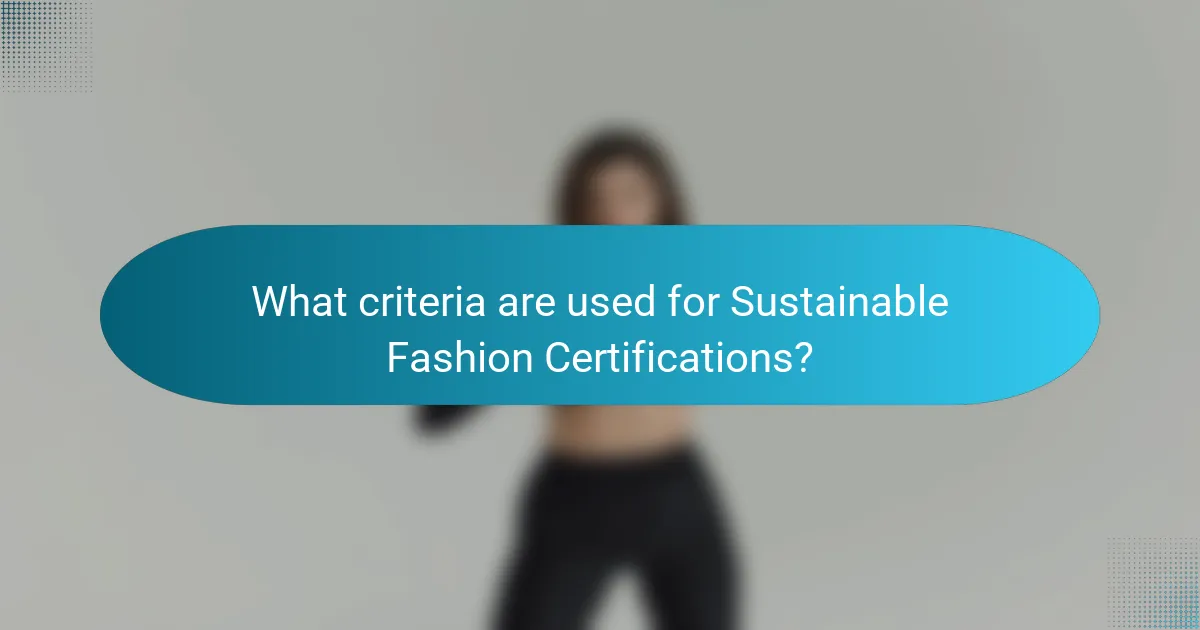
What criteria are used for Sustainable Fashion Certifications?
Sustainable Fashion Certifications use criteria such as environmental impact, social responsibility, and ethical labor practices. These certifications assess the use of sustainable materials and production processes. They also evaluate the brand’s transparency and traceability in the supply chain. Certifications often require adherence to specific standards for waste management and resource conservation. Additionally, they may include criteria for fair trade practices and community engagement. Brands must demonstrate compliance through audits and documentation. This ensures accountability and fosters consumer trust in sustainable fashion.
What are the common standards across these certifications?
Common standards across sustainable fashion certifications include environmental sustainability, ethical labor practices, and transparency. Environmental sustainability focuses on reducing waste and resource consumption. Ethical labor practices ensure fair wages and safe working conditions. Transparency requires brands to disclose their supply chain and production processes. These standards help consumers identify responsible brands. Certifications like GOTS and Fair Trade adhere to these criteria, promoting a more sustainable fashion industry.
How is environmental impact assessed in these criteria?
Environmental impact in sustainable fashion certifications is assessed through specific criteria evaluating resource use and waste management. These criteria include the assessment of carbon emissions, water consumption, and chemical usage throughout production processes. Certifications often require lifecycle analyses to determine the environmental footprint of products. Additionally, they evaluate the sustainability of materials sourced, emphasizing organic or recycled options. Third-party audits are commonly employed to verify compliance with these criteria. Reports from organizations such as the Global Organic Textile Standard provide detailed methodologies for these assessments. This ensures transparency and accountability in the fashion industry.
What social responsibility measures are included?
Social responsibility measures included in sustainable fashion certifications often encompass fair labor practices, environmental sustainability, and community engagement. Fair labor practices ensure that workers receive fair wages and work in safe conditions. Environmental sustainability focuses on reducing waste and promoting the use of eco-friendly materials. Community engagement involves supporting local communities through various initiatives. Certifications like GOTS and Fair Trade outline these measures explicitly. They provide a framework for brands to adhere to ethical standards. These measures help consumers make informed choices about their purchases.
How do brands achieve these certifications?
Brands achieve sustainable fashion certifications by meeting specific criteria set by certifying organizations. These criteria often include environmental practices, social responsibility, and transparency in supply chains. Brands must conduct audits and provide documentation to demonstrate compliance. They may also need to implement sustainable practices, such as using organic materials or reducing waste. Certification bodies evaluate the submitted evidence against their standards. Successful brands receive certification after passing the assessment. For example, the Global Organic Textile Standard (GOTS) requires strict adherence to organic farming practices and social criteria. This process ensures that certified brands are genuinely committed to sustainability.
What processes must brands follow to obtain certification?
Brands must follow specific processes to obtain certification in sustainable fashion. First, they need to identify the relevant certification body. Each body has specific criteria and guidelines for certification. Brands must then gather necessary documentation demonstrating compliance with these standards. This can include supply chain transparency and sustainability practices. After documentation is prepared, brands submit an application for review. The certification body will conduct an audit to verify claims made by the brand. If successful, the brand receives certification, which may require periodic renewal. Compliance with ongoing standards is essential for maintaining certification status.
What documentation is required for certification?
Certification requires specific documentation to validate compliance with standards. Common documents include proof of sustainable practices, supply chain transparency reports, and environmental impact assessments. Additional requirements may involve ethical sourcing certificates and labor compliance documentation. Each certification body may have unique requirements. For instance, the Global Organic Textile Standard (GOTS) requires detailed production process documentation. These documents ensure that brands adhere to sustainability criteria. Proper documentation is essential for achieving certification and maintaining consumer trust.
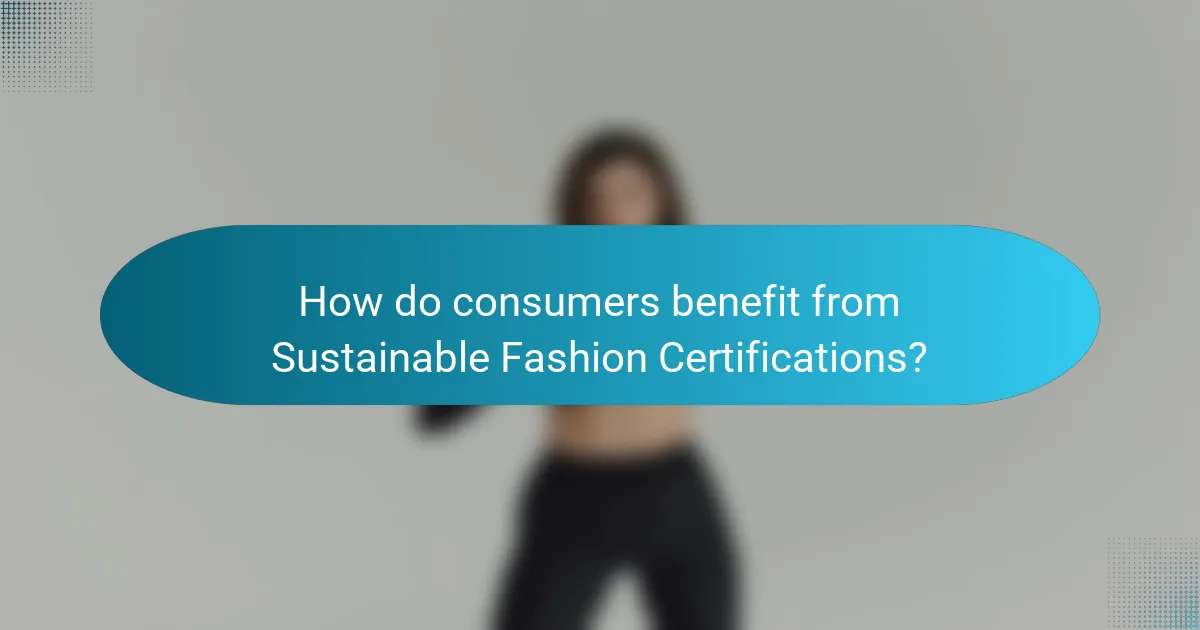
How do consumers benefit from Sustainable Fashion Certifications?
Consumers benefit from Sustainable Fashion Certifications by gaining assurance of ethical practices. These certifications verify that brands adhere to environmentally friendly and socially responsible standards. For example, certifications like GOTS and Fair Trade ensure organic materials and fair labor practices. This transparency helps consumers make informed choices aligned with their values. Additionally, certified products often have a lower environmental impact. Research indicates that 66% of consumers are willing to pay more for sustainable goods. Certifications enhance brand credibility and can lead to increased consumer trust. Ultimately, these benefits support a more sustainable fashion industry.
What should consumers look for in certified products?
Consumers should look for transparency in certified products. This includes clear information about sourcing, production processes, and labor practices. Certifications should be from reputable organizations recognized in sustainable fashion. Labels should specify the criteria met for certification, such as environmental impact or ethical labor standards. Consumers should verify the authenticity of certifications through official websites. Research indicates that certifications can enhance consumer trust and product value. A study by the Ethical Consumer Research Association found that 75% of consumers prefer certified products for their sustainability claims.
How can certifications guide ethical purchasing decisions?
Certifications guide ethical purchasing decisions by providing verified information about product standards. They help consumers identify brands that adhere to sustainable and ethical practices. Certifications like Fair Trade and GOTS ensure fair labor practices and environmentally friendly production. These labels offer transparency, allowing consumers to make informed choices. Research shows that 66% of consumers are willing to pay more for sustainable brands. This willingness is driven by trust in certified products. Certifications also reduce the risk of greenwashing, where brands falsely claim sustainability. Overall, certifications empower consumers to support ethical practices in the fashion industry.
What are the long-term benefits of supporting certified brands?
Supporting certified brands leads to long-term environmental sustainability. Certified brands adhere to strict guidelines that reduce waste and pollution. They often use eco-friendly materials, minimizing their carbon footprint. Additionally, supporting these brands promotes fair labor practices. This ensures workers receive fair wages and safe working conditions. Research shows that consumers favor brands with certifications, enhancing brand loyalty. A study by the Ethical Consumer Research Association found that 50% of consumers prefer certified products. This trend encourages more brands to pursue certification, amplifying positive impacts. Supporting certified brands ultimately fosters a more sustainable and ethical marketplace.
What challenges do consumers face in understanding certifications?
Consumers face several challenges in understanding certifications. One major challenge is the complexity of certification criteria. Many certifications have detailed and technical requirements that can be difficult to interpret. Additionally, the abundance of certifications creates confusion. Consumers may struggle to differentiate between similar certifications with varying standards.
Another challenge is the lack of transparency in the certification process. Some certifications do not clearly disclose how they are awarded or what specific practices they endorse. This can lead to skepticism about the credibility of the certifications.
Moreover, consumers often lack access to reliable information. Research indicates that many consumers do not know where to find trustworthy sources for understanding certifications. This gap in knowledge can hinder informed purchasing decisions.
Lastly, marketing tactics can mislead consumers. Brands may use certification logos without proper adherence to the standards, creating a false sense of security. These challenges collectively contribute to consumer confusion regarding sustainable fashion certifications.
How can misinformation about certifications be avoided?
Misinformation about certifications can be avoided through education and transparency. Providing clear, accessible information about certification processes is essential. Organizations should publish detailed criteria and standards for each certification. This allows consumers to verify claims independently. Regular updates on certification status should be communicated to the public. Engaging with third-party audits enhances credibility and trust. Encouraging consumer feedback can highlight discrepancies and misinformation. Collaborating with industry experts can further clarify certification significance. Implementing a centralized database of verified certifications can serve as a reliable resource.
What resources are available to educate consumers on these certifications?
Consumers can educate themselves on sustainable fashion certifications through various resources. Websites of certification bodies provide detailed information about their standards and processes. Organizations such as the Global Organic Textile Standard (GOTS) and the Fair Trade Foundation offer educational materials online. Additionally, government websites often contain guidelines on sustainable practices in fashion. Non-profit organizations focused on sustainability also publish reports and articles. Social media platforms feature influencers and experts discussing these certifications. Educational webinars and workshops are frequently hosted by industry groups. Books and documentaries on sustainable fashion further enhance consumer knowledge.
What practical tips can consumers use when choosing sustainable fashion?
Consumers can choose sustainable fashion by looking for certifications that indicate ethical practices. Certifications like GOTS, Fair Trade, and OEKO-TEX ensure environmental and social responsibility. Research brands’ transparency regarding their supply chains to verify their sustainability claims. Opt for high-quality, timeless pieces that reduce the need for frequent replacements. Consider second-hand options to extend the lifecycle of garments. Support local artisans and brands that prioritize sustainability. Evaluate the materials used; organic or recycled fabrics are often more sustainable. Finally, educate yourself about brands’ sustainability initiatives to make informed choices.
Sustainable Fashion Certifications in the UK are essential standards that validate eco-friendly practices within the fashion industry, focusing on ethical labor, environmental impact, and sustainable sourcing. Key certifications include the Global Organic Textile Standard (GOTS), Ethical Trading Initiative (ETI), and Fair Trade, which guide consumers in identifying responsible brands. The article explores the importance of these certifications, the criteria used for assessment, and the common standards they uphold. Additionally, it highlights the benefits for consumers, the challenges in understanding certifications, and resources available for education on sustainable fashion practices.
